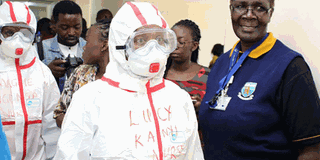Midwives cry for PPEs, fear exposure to Covid-19

Nurses fully geared up in PPEs at Mbagathi Hospital, Nairobi during the launch of an isolation and treatment centre for the Covid-19 patients in March. PHOTO | JARED ANGOTE | NATION MEDIA GROUP
What you need to know:
- Kakamega County team says their work is compromised by lack of the PPEs
- Mombasa, Kiambu express fear that the lives of expectant mothers may be put on the line
- MAK proposes use of tele-care services where expectant mothers seek their services through a toll free number
Midwives working in various public hospitals across the county have raised the red flag over lack of Personal Protective Equipment (PPEs), exposing them to Covid-19.
During a webinar to discuss challenges they are facing in the wake of the pandemic, said expressed fear of contracting the virus due to lack of protective gear.
Catherine Shinyenji, based in Kakamega County, said their work is getting compromised by lack of the PPEs.
“Midwives are getting guidance on how to stay safe during this period but lack of PPEs is putting us in a compromise,” she said, adding that they have mapped out expectant women to ensure they get pre-natal care.
Caroline Shituma and Esfer Mbua from Mombasa and Kiambu respectively, expressed fear that the lives of many expectant mothers may be put on the line if midwives retreat for fear of contacting the virus.
SOCIAL DISTANCING
“As we try to encourage social distancing, we are only allowing one visitor at a time to minimise congestion in the maternity wards,” said Ms Mbua.
Eunice Barbucha from Moi Teaching and Referral Hospital in Eldoret said maintaining social distance is a challenge at the facility.
“We are currently receiving expectant mothers from other health facilities resulting in congestion. We have therefore resulted to immediate discharge after delivery to reduce congestion,” she said.
Boniface Mutisya, who represents Midwives Association of Kenya (MAK) at the Nursing Council Board, however, cautioned against quick discharge of mothers.
To deal with the threat of midwives contracting coronavirus from their clients, Jeremiah Maina, a member of MAK proposed the use of tele-care services where expectant mothers seek the services of midwives through a toll free number.
Maina said the safety of the midwives is paramount and called on the government to ensure they are trained on how to take care of any possible case of Covid-19 in expectant mothers.
MAK chairperson Ms Louisa Muteti said lack of protective gear for the midwives and lack of family planning supplies was a bad pointer.
“Lack of PPEs for the midwives may end up putting them and the expectant mothers they are serving at risk. Cases of unwanted pregnancies among mothers may also rise due to lack of the vital family planning commodities,” said Ms Muteti.
Details also emerged during the webinar that family planning supplied have run out in many hospitals across the country.
An advisor at United Nations Population Fund (UNPF) Dr Dan Okoro, said it is the desire of his organisation to see every child birth is safe and that strategies for reproductive health put in place by the government are implemented.
FRONTLINE WORKERS
Dr Okoro added that his organisation is engaging the Ministry of Health and other relevant stakeholders on the National midwifery policy that is aimed to come up with a new syllabus that will entail the scope of practice that will be used in the training.
“We are also stating this week going to give PPEs to 16 counties to ensure their front-line workers are safe,” he said.
Things are a bit different in private hospital with the midwives who spoke saying the PPEs for them is not a problem.
Caroline Mwololo from Mater Hospital in Nairobi, however, said midwives in the health facility have all the protective gear they require.
“The midwives have the PPEs and the expectant mothers are given masks every day. To ensure requisite social distance, we are only allowing the partner or the next of kin,” she said.
She added that despite the ongoing pandemic, the number of deliveries have not been affected.
Every month, she said, the hospital handle 150-170 deliveries. In April, a total of 143 deliveries were done at the health facility.





